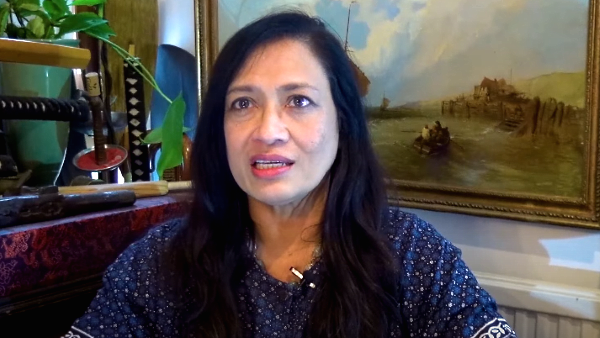
By Mariam Mokhtar
Outraged animal lovers have condemned the cruelty exhibited by Ipoh City Council workers and their failure to adhere to the standard operating procedures (SOPs) when catching stray dogs in the city.
For several months, netizens have shared photos of the increasing abuse towards stray dogs in their areas.
Dogs have been noosed then dragged along the roads before being caged and dumped in a landfill in the town of Papan in the countryside.
One lady found the motionless bodies of several dogs in an Ipoh back lane. They had been poisoned, with blood oozing from their mouths.
Over the years, concerned citizens have lodged many police reports about the cruelty, so why does this issue of abuse towards dogs a recurring problem?
On 1 April, David Yim Boon Leong lodged a police report about the cruelty meted out on dogs by the dog catching unit of Ipoh City Council. He then posted his appeal on Facebook urging others to do the same.
Where is our human compassion? Why are the SOPs ignored? Is there no political will to resolve the problem of stray dogs?
Last year, animal lovers expressed concern that during the coronavirus pandemic, more dogs would be dumped as their owners became short of funds to feed them. Others have found that during lockdown, the caring for dogs was too bothersome a responsibility.
One dog owner said, "The rise in stray dogs is not confined to Ipoh, with outlying towns like Kampar, Gopeng and Batu Gajah experiencing the same problem. Something needs to be done because the authorities cannot cope."
Another added, "My friend who works with an animal NGO said that despite efforts to meet the mayor to decide on a plan of action, the mayor kept canceling the meetings. Recently, three meetings were postponed in a month."
One Ipohite said, "They are rounding up the strays because the council wants to promote tourism. If being inhumane towards animals is how the council cleans up the city, then I can do without tourists."
A social activist said, "Ipoh is a city that is tainted with the blood of stray dogs. When we come across a council worker being cruel towards dogs, he usually ignores our pleas to show compassion to the dogs. Every day, around 15 dogs are caught and dumped in Papan."
Stories are shared that stray dogs are simply dumped by the roadside in Papan. Many flee into the jungle whilst others are run over by rubbish trucks.
Groups of volunteers have built simple shelters, and take turns to bring food and water to the dogs.
Having been traumatized by their experience of being caught, only the dogs which are daring enough to come forward will eat. Others simply waste away.
Many dogs try to leave the area but the puppies are often knocked down as they try to cross the busy highway near Papan which links Ipoh to Lumut.
One said, "Packs of dogs may stumble into kampungs and housing estates, where frightened residents poison them. Many are not familiar with dogs and have been conditioned to think that dogs are unclean animals."
Veterinarian Dr Ranjit Mendhir Kaur, who set up the animal welfare charity called "Noah's Ark Ipoh" (NAI) in 2005 to deal with the acute and growing stray dog problem, expressed her frustration when dealing with council workers.
She claimed that for 14 years, council workers have shown no professionalism, nor are they humane in their methods of dog catching.
Dr Ranjit said, "We are quick to emulate the West regarding road sweepers and the like, but we are backward when it comes to dog catching. We are almost barbaric!
"Despite being the second largest city in Malaysia, Ipoh has no dog pounds. Dogs are kept in cages in lorries, crammed together in rain or shine.
"If the council must catch a nuisance dog, could they not spare the ones which have owners or have been neutered?" NAI pioneered the Trap-Neuter-Release (TNR) technique.
NAI's shelter manager Malika Ramiah Oates said, "If Ipoh had a pound like other states, owners could go and redeem their dogs."
Oates explained that the problem was not just the catching, but also the methods used to catch the dogs.
She said, "We would like the mayor to leave the strays which have been rescued by the charities. They are neutered and fed.
"The council should only pick up nuisance dogs and not the ones that are old and quite happy to eat and sleep."
Oates wonders why the council refuses to work with NGOs. She said, "Just telling us that they do not want dogs on the streets is not good enough."
Strays which are ill are not put down humanely to reduce their suffering because it is claimed that NGOs are not permitted to euthanize the strays, as only vets or staff from the Veterinary Department are authorized to do so.
Despite laws to protect animals, some people allege that the by-laws are often interpreted to suit the council.
Although many animal cruelty videos have been shown on social media, members of the public wonder if government employees are ever penalized for their cruelty.
The prophet said that a good deed done to an animal is as meritorious as a good deed done to a human, while an act of cruelty to an animal is as bad as an act of cruelty to a human.
Will the Ipoh city council or any other town council improve the treatment of stray dogs? Will they make the effort to engage with animal NGOs?
Source:
1. Malay Mail: With no food and water for strays released by Ipoh City Council at Papan landfill, volunteers step in to fill the gap
2. Juice Online: Did you know Ipoh City Council places captured stray dogs at dumpsite with no food and shelter?
3. Harian Metro: Sembilan anjing mati dipercayai diracun
4. Facebook: Video and appeal
5. Malay Mail: Some Ipoh dog rescuers are taking the initiative to spay, neuter strays as a more humane way to control population
6. Free Malaysia Today: Ipoh court grants injunction against shooting of stray dogs
7. Noah's Ark Ipoh: Welcome to Noah's Ark Ipoh Animal Welfare
8. Inspired By Muhammad: A good deed done to an animal is like a good deed done to a human being
(Mariam Mokhtar is a Freelance Writer.)
ADVERTISEMENT
ADVERTISEMENT


































